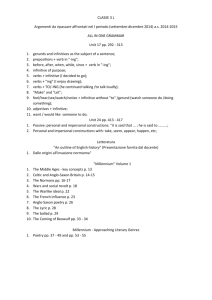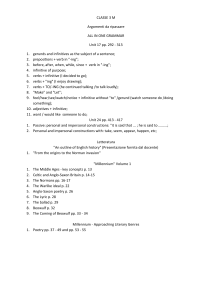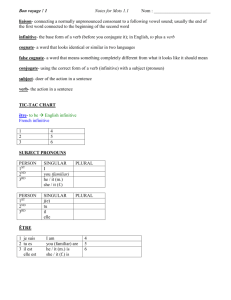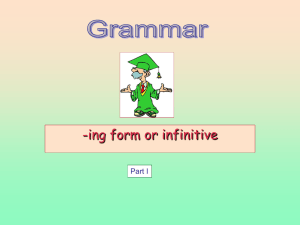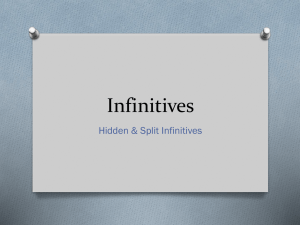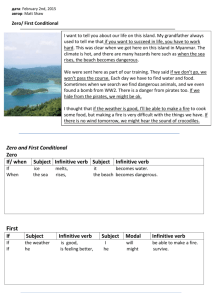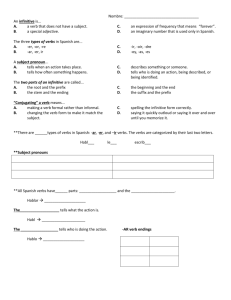Infinitive or ing-Form?
advertisement
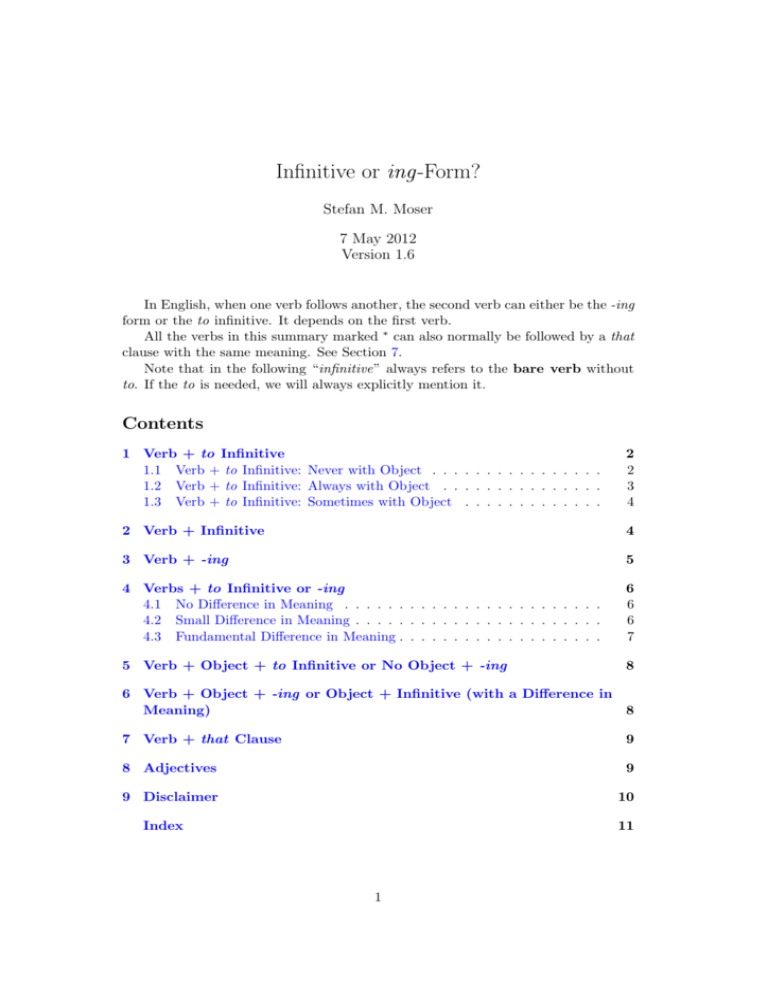
Infinitive or ing-Form? Stefan M. Moser 7 May 2012 Version 1.6 In English, when one verb follows another, the second verb can either be the -ing form or the to infinitive. It depends on the first verb. All the verbs in this summary marked ∗ can also normally be followed by a that clause with the same meaning. See Section 7. Note that in the following “infinitive” always refers to the bare verb without to. If the to is needed, we will always explicitly mention it. Contents 1 Verb + to Infinitive 1.1 Verb + to Infinitive: Never with Object . . . . . . . . . . . . . . . . 1.2 Verb + to Infinitive: Always with Object . . . . . . . . . . . . . . . 1.3 Verb + to Infinitive: Sometimes with Object . . . . . . . . . . . . . 2 2 3 4 2 Verb + Infinitive 4 3 Verb + -ing 5 4 Verbs + to Infinitive or -ing 4.1 No Difference in Meaning . . . . . . . . . . . . . . . . . . . . . . . . 4.2 Small Difference in Meaning . . . . . . . . . . . . . . . . . . . . . . . 4.3 Fundamental Difference in Meaning . . . . . . . . . . . . . . . . . . . 6 6 6 7 5 Verb + Object + to Infinitive or No Object + -ing 8 6 Verb + Object + -ing or Object + Infinitive (with a Difference in Meaning) 8 7 Verb + that Clause 9 8 Adjectives 9 9 Disclaimer 10 Index 11 1 Infinitive or ing-Form? 1 2 Verb + to Infinitive 1.1 Verb + to Infinitive: Never with Object (can’t) afford ∗ agree aim appear ∗ arrange attempt choose ∗ decide ∗ demand deserve fail ∗ hope learn manage neglect offer omit ought plan prepare ∗ pretend ∗ promise refuse seem tend ∗ threaten (can’t) wait ∗ wish Examples: • If you decide to add nuts. . . • Don’t expect to have much cake left. Notice how the negative is formed: • If you decide not to ice it. . . Remark 1. Note the usage of promise: • I promise you something. • I promise to do something. • I promise (you) (that) I will do something. • But not: I promise you to do something. Remark 2. Modal verbs are normally only with infinitive without to, see Section 2. The exception is the special modal verb ought: • He ought to tell his boss about it. Being a modal verb, the negation not applies to the verb directly: • He ought not to go. Note that to is required both in affirmative and negative statements. Reserve ought for expressing obligation, duty, or necessity, and use should for expressing suitability or appropriateness. c Stefan M. Moser 7 May 2012, Version 1.6 Infinitive or ing-Form? 1.2 3 Verb + to Infinitive: Always with Object dare encourage force invite remind teach tell warn order persuade Examples: • Her father taught her to play tennis. • The teacher reminded the children to bring their swimming things. Remark 3. Dare has two fundamentally different meanings. With object it means “defy or challenge someone to do something”: • She was daring him to disagree. In this form it always is verb + to infinitive. Without object it means “have the courage to do something” and can look verb + to infinitive or verb + infinitive (without to) depending on the situation: • Everyone in the office complains that he smells awful, but nobody dares (to) mention it to him. • I’d never dare (to) talk to my mother like that. • I wouldn’t dare have a party in my flat in case the neighbors complained. (Do not use to here!) • I dare not/don’t dare think how much it’s going to cost. (Do not use to here!) • A story she dares not write down. Rule of thumb: Do not put to after wouldn’t dare, don’t dare or dare not (not refers to dare), otherwise both are possible. Be careful about the negation: if the not refers to dare, then don’t put to, if the not refers to the verb, then do put a to: • An incident he dares not tell anyone (about). = he is afraid to talk about it • An incident he dares not to tell anyone. = he has the courage to refuse to talk about it c Stefan M. Moser 7 May 2012, Version 1.6 Infinitive or ing-Form? 1.3 4 Verb + to Infinitive: Sometimes with Object ask ∗ assume ∗ request want beg ∗ expect help ∗ intend Examples: • We expected to be late. ⇐⇒ We expected Tom to be late. • We wanted to stay longer. ⇐⇒ We wanted them to stay longer. Remark 4. Help can be followed by the infinitive with or without to. • We helped them (to) start their car. But note that can’t help can be followed by the -ing form, but then has a different meaning (see Section 4.3). Remark 5. Would like, would prefer, would hate, and would love are also followed by the to infinitive. See Remark 10. Remark 6. Unlike the less formal ask, request usually sounds better when followed by that, rather than object + to infinitive: • Better: We requested that the staff prepare the suites. Awkward: We requested the staff to prepare the suites. • Better: Hilda requested that he not drive across the lawn. Awkward: Hilda requested him not to drive across the lawn. 2 Verb + Infinitive Modal verbs: Other expressions: can could may might must needn’t shall should will would had better would rather make + object let + object have + object dare (see Remark 3) help (see Remark 4) c Stefan M. Moser 7 May 2012, Version 1.6 Infinitive or ing-Form? 5 Examples: • You should add them slowly. • You needn’t include nuts. • Let the cake cool for half an hour. • I made my sister help with the cooking. • I had the plumber repair the leak. Remark 7. The passive form of make is followed by the to infinitive. • I was made to do my homework. ⇐⇒ My father made me do my homework. • She was made to cut her hair. ⇐⇒ I made her cut her hair. For the only modal verb ought that needs a to, see Remark 2. 3 Verb + -ing ∗ appreciate avoid can’t face can’t stand carry on ∗ confess ∗ consider delay ∗ deny detest dislike enjoy involve feel like finish give up ∗ imagine keep keep on ∗ mention (not) mind miss postpone practise put off quit risk resist ∗ suggest ∗ admit resort to fancy to Examples: • I enjoy making it. • Avoid adding the eggs. . . • Keep doing this. . . • I suggest adding a little lemon juice. . . Notice how the negative is formed: • If you don’t leave immediately, you risk not catching your plane. • Can you imagine not having a mobile phone nowadays? c Stefan M. Moser 7 May 2012, Version 1.6 Infinitive or ing-Form? 6 Remark 8. Admit and resort are special cases:1 they need the preposition to before the -ing: • He admitted to having lied. • After their last horse had died, they resorted to walking. 4 Verbs + to Infinitive or -ing 4.1 No Difference in Meaning begin can’t bear cease continue hate prefer ∗ propose start Examples: • Continue adding the flour. ⇐⇒ Continue to add the flour. • I prefer using apricots. ⇐⇒ I prefer to use apricots. • I hate making cakes. ⇐⇒ I hate to make cakes. Remark 9. Two -ing forms do not usually follow each other: • I was starting to make a cake when the phone rang. • not: I was starting making a cake. . . 4.2 Small Difference in Meaning like love Like + to infinitive has a slightly different meaning from like + -ing: • I like to catch the early bus on Mondays. = this is a good plan or it’s a habit, but not necessarily something I enjoy. • I like dancing. = I enjoy it. 1 In the case of admit the to is sometimes dropped. Moreover, one can also say He admitted that he lied., see Section 7. c Stefan M. Moser 7 May 2012, Version 1.6 Infinitive or ing-Form? 7 The same remark holds also true for love. Remark 10. Like, prefer, hate and love can be followed by the to infinitive or -ing, but would like, would prefer, would hate and would love are always followed by the to infinitive. • She would like to go out, but we would prefer to stay in. 4.3 Fundamental Difference in Meaning ∗ remember ∗ forget ∗ regret try stop mean go on can’t help Verb + to infinitive Verb + -ing Remember to check whether the cake is ready. = an action which will be necessary I remember checking that I had my keys when I left the house. = a memory of a past action Don’t forget to add the baking powder. = an action which will be necessary I’ll never forget going to school on my own for the first time. = a memory of a past action I regret to inform you that your application was unsuccessful. = I am sorry to tell you. . . We regret sending our daughter to that school. = we wish we hadn’t Try to ice the cake quickly. = attempt to do it if you can Try adding nuts as it will improve the flavour. = as an experiment She stopped to have a rest. = in order to have a rest Stop beating when the mixture is pale and fluffy. = finish doing it They don’t mean to upset you. = they don’t intend to If you go by train that means taking a taxi to the station. = it involves He went on to tell them how to make a different cake. = the next thing he did was to tell them. . . He went on cycling until he reached the farm. = he continued I can’t help you (to) fix the car. = I don’t know how to fix the car or I don’t have the time to fix it (see Remark 4) I can’t help looking at you. = I cannot avoid/prevent it c Stefan M. Moser 7 May 2012, Version 1.6 Infinitive or ing-Form? 5 8 Verb + Object + to Infinitive or No Object + -ing The following verbs are followed by the to infinitive when they have an object and by -ing when they have no object: ∗ advise allow forbid permit ∗ recommend Examples: • I advise adding nuts. ⇐⇒ I advise you to add nuts. • They allow using force. ⇐⇒ They allow us to use force. • I recommend using apricots. ⇐⇒ I recommend you to use apricots. Remark 11. Note that the use of recommend with object and to infinitive sounds a bit awkward to some people. It is more common to use this structure in passive voice: • You are recommended to use apricots. or to use a that clause (where the that often is omitted, see Section 7): • I recommend (that) you use apricots. 6 Verb + Object + -ing or Object + Infinitive (with a Difference in Meaning) The following verbs always have an object (mainly to do with senses): feel hear see watch Notice the difference in meaning between verb + -ing and verb + infinitive: • She felt her passion dwindling away. = a continuing process over a period of time She felt someone touch her shoulder. = short completed action • She heard her mother singing as she came downstairs. = continuing action She heard the doorbell ring. = a short completed action c Stefan M. Moser 7 May 2012, Version 1.6 Infinitive or ing-Form? 9 • I watched the boys playing football. = an activity continuing over a period of time I watched the boy kick the football into the road. = short completed action • They see their rights being taken away. = a continuing process over a period of time They saw the cat kill the mouse. = short completed action However, note that see also has a third possible usage with to + infinitive: • I went to see Colin to hand over the keys. = purpose of seeing someone/something 7 Verb + that Clause We remind the reader that all verbs marked ∗ in this summary can also be followed by a that clause with the same meaning. Often the that can also be omitted. • I suggest adding some lemon juice. = I suggest (that) you add some lemon juice. • I recommend using sultanas and apricots. = I recommend (that) you use sultanas and apricots. • They agreed to leave early. = They agreed (that) they would leave early. 8 Adjectives The following adjectives are usually followed by the to infinitive: afraid cheap † dangerous delighted † difficult † easy expensive happy impossible interesting † nice pleased possible safe sorry surprised Examples: • I’m surprised to see you here. • She is too cheap to send me a postcard. = she is stingy, not generous c Stefan M. Moser 7 May 2012, Version 1.6 Infinitive or ing-Form? The adjectives marked meaning. 10 † can sometimes also be followed by -ing with the same Examples: • It’s nice meeting friends after school. ⇐⇒ It’s nice to meet friends after school. Remark 12. Notice the different ways of using afraid : • I’ve always been afraid of flying. • Don’t be afraid to say what you think. • She was afraid (that) he might be upset if she told him. • She was afraid for her children. 9 Disclaimer This document is based on several grammar books and my own research in dictionaries, etc. If you find mistakes or other interesting verbs or facts that could be added, I would be delighted to receive your feedback! Write to Thanks! c Stefan M. Moser Stefan M. Moser 7 May 2012, Version 1.6 Infinitive or ing-Form? 11 Index admit, 5, 6 advise, 8 afford, 2 afraid, 9, 10 agree, 2 aim, 2 allow, 8 appear, 2 appreciate, 5 arrange, 2 ask, 4, 4 assume, 4 attempt, 2 avoid, 5 bear, 6 beg, 4 begin, 6 better, 4 can, 4 can’t afford, 2 can’t bear, 6 can’t face, 5 can’t help, 7 can’t stand, 5 can’t wait, 2 carry on, 5 cease, 6 cheap, 9 choose, 2 confess, 5 consider, 5 continue, 6 could, 4 dangerous, 9 dare, 3, 3, 4 decide, 2 delay, 5 delighted, 9 demand, 2 deny, 5 deserve, 2 detest, 5 c Stefan M. Moser difficult, 9 dislike, 5 easy, 9 encourage, 3 enjoy, 5 expect, 4 expensive, 9 face, 5 fail, 2 fancy, 5 feel, 8 feel like, 5 finish, 5 forbid, 8 force, 3 forget, 7 give up, 5 go on, 7 had better, 4 happy, 9 hate, 6, 7 have, 4 hear, 8 help, 4, 4, 7 hope, 2 imagine, 5 impossible, 9 intend, 4 interesting, 9 invite, 3 involve, 5 keep, 5 keep on, 5 learn, 2 let, 4 like, 6, 7 love, 6, 7 make, 4, 5 7 May 2012, Version 1.6 Infinitive or ing-Form? manage, 2 may, 4 mean, 7 mention, 5 might, 4 mind, 5 miss, 5 must, 4 needn’t, 4 neglect, 2 nice, 9 offer, 2 omit, 2 order, 3 ought, 2, 2, 5 permit, 8 persuade, 3 plan, 2 pleased, 9 possible, 9 postpone, 5 practise, 5 prefer, 6, 7 prepare, 2 pretend, 2 promise, 2, 2 propose, 6 put off, 5 12 should, 4 sorry, 9 stand, 5 start, 6 stop, 7 suggest, 5 surprised, 9 teach, 3 tell, 3 tend, 2 threaten, 2 try, 7 wait, 2 want, 4 warn, 3 watch, 8 will, 4 wish, 2 would, 4 would hate, 4, 7 would like, 4, 7 would love, 4, 7 would prefer, 4, 7 would rather, 4 quit, 5 rather, 4 recommend, 8 refuse, 2 regret, 7 remember, 7 remind, 3 request, 4, 4 resist, 5 resort, 5, 6 risk, 5 safe, 9 see, 8 seem, 2 shall, 4 c Stefan M. Moser 7 May 2012, Version 1.6
